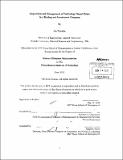Acquisition and management of technology-based firms in a trading and investment company
Author(s)
Tanaka, Jin, M.B.A. Massachusetts Institute of Technology
DownloadFull printable version (3.788Mb)
Other Contributors
Sloan School of Management.
Advisor
Michael A. Cusumano.
Terms of use
Metadata
Show full item recordAbstract
Among several key factors affecting new technology innovation, two important ones that are sometimes disturbed by M&A are long-term p-ans and the commitment of the acquired firm's management team. M&A led by technology companies are most often motivated by their need for certain technology, and most mergers, the strategies to grow the new company are quite clear. However, when M&A are led by financial investors or non-technology-based firms like private equity or trading and investment companies, the post-merger growth strategy to develop and manage the acquired firm's technology is often not well thought out. This is generally related to their lack of capability of managing of technology which can disturb long-term R&D work. However, some M&A carried out by private equity or trading and investment company, have had positive results. This study compares three M&A cases of trading and investment companies, private equity, and technology-based companies of technology-based firms. Comparisons are made based on financial figures, the ability to manage technology, and the success of the post-merger integration process. This study concludes with three suggestions, continuous synergy creation from parent company is essential for sustainable growth, corporate culture and business synergy must be considered carefully during the integration process, and retention of R&D employees and maintaining a technology-oriented corporate culture and environment are very critical for firm's new technology innovation.
Description
Thesis (M.B.A.)--Massachusetts Institute of Technology, Sloan School of Management, 2012. Cataloged from PDF version of thesis. Includes bibliographical references (p. 68-70).
Date issued
2012Department
Sloan School of ManagementPublisher
Massachusetts Institute of Technology
Keywords
Sloan School of Management.